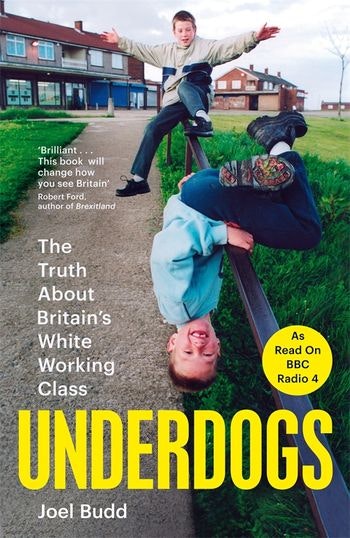While the progressive left insists the ethnic premodifier in white working class is redundant — since, in their view, this group suffers only the same economic misfortunes as their minority class-counterparts — the populist right is thought to mythologise the group as custodians of common sense, pitted heroically against an out-of-touch liberal elite.

Between the complacency of the former and the opportunism of the latter, Joel Budd’s Underdogs stakes out a polite and good-faith attempt at charting a middle course. At its best, the book feels gently radical, especially in its fresh typology of a group often caricatured or ignored entirely. Budd is measured, thoughtful, and willing to complicate familiar narratives. But at other points, this middle-course begins to resemble the shaky terrain of the exhausted centrist consensus. Budd’s faith in the post-Cold War orthodoxy — the frictionless flow of goods, capital, and people across borders as an unquestionable good — remains largely intact; and objections to that order are dismissed as nostalgic grumbling, typically attributed to Boomers too blinkered to appreciate the fruits of globalisation.
The book advances two central claims. First, while the white working class does face distinct challenges not shared by ethnic minorities of the same socioeconomic bracket, these are less the result of some orchestrated anti-white agenda than of stark geographical disparities. Second, the white working class is nothing like its popular image: not a monolithic bloc of angry nostalgists, mourning the loss of heavy industry and raging at immigration.
Budd weaves literary criticism, folk memory, and reportage into a portrait of remarkable subtlety and wit, taking in the fading subcultures of boy racers and old-school bank robbers alongside the everyday realities of housing estates and post-industrial towns. Drawing inspiration from Ferdynand Zweig — the British Jewish sociologist who, as Budd notes, was “more of an outsider than I am” — Budd aligns himself in the tradition of the sympathetic external observer, attentive to the cultural and temperamental nuances within working-class life. Zweig’s exploration of the differences between coal miners and steelworkers becomes the launchpad for Underdogs’ most original intervention: a typology of white British working-class communities, segmented not by income or education, but by their varying exposure to demographic change — and, therefore, the importance of ethnicity in their daily lives.
But his argument is not simply that working-class people differ from one another. Budd’s deeper claim is that different locations generate different relationships to identity, belonging, and ethnicity in an increasingly plural nation. His tripartite schema —“heartlands,” “enclaves,” and “colonies” — forms the backbone of this analysis.
Much of the existing literature that frames the white working class as a self-conscious, embattled group — resentfully bristling at the effects of mass migration — is, Budd argues, describing only one kind of setting: the enclave. These are neighbourhoods on the fault lines of urban diversity, typically in the deprived outer reaches of cities, where immigration is most visible and the perception of resource competition — over housing, healthcare, and welfare — is most acute. Here, ethnic identity becomes salient by proximity; the sense of being “put upon” emerges from daily encounters with a rapidly transformed social fabric.
By contrast, the “heartlands” are the small towns and villages largely bypassed by these changes. Remote from the engines of the new economy, they exert little magnetic pull on migrants. As a result, they remain more ethnically homogenous and more culturally stable. In such places, whiteness is ambient, not politicised — there is no pressing need for self-definition along racial lines. It’s no coincidence, Budd notes, that far-right parties like the BNP tend to fare poorly in these zones. The heartlands don’t rage against immigration because, in the most immediate sense, immigration hasn’t arrived.
Then there are the “colonies” — settlements populated by internal migrants, often former city dwellers, including the postwar Cockney diaspora. Thetford in Norfolk, Budd’s favoured case study, embodies this category: a town shaped by mid-century efforts to decentralise industry, its cultural roots traceable to the displaced working-class communities of London’s East End.
It’s a compelling framework that moves well beyond popular caricatures. But Budd’s moderation sometimes curdles into dismissal. In trying to avoid the vernacular of the culture wars, he downplays the emotional and political weight, or legitimacy, of perceived group injury. “I find the ill-treatment of white working-class people as a group less worrying,” he writes, “than the political exploitation of the idea that they are being ill-treated.” It’s a revealing line, suggesting that even as Budd seeks to weave nuance into the story, there is a reluctance to engage with potential asymmetries in multiculturalism.
Populists, in his telling, are a trigger-happy bunch firing rhetorical blanks. They claim white working-class people are systematically discriminated against, their views ignored or suppressed, and that because of this they are “faring terribly badly as a group.” Budd rejects this categorically: “They have not been left behind because of metropolitan conspiracy,” he writes. In so doing, he constructs an uncharitable caricature of the populist right — drawn less as a serious political opponent than as a pantomime rabble-rouser, devoid of nuance and any kind of structural critique.
Though Budd is a careful and courteous thinker … this book is often written in lofty tones of mainstream condescension
This strawman is conveniently ignorant of the socio-economic realities at play, setting Budd up for a series of soft putts. Where you were born, what your parents did, the kind of jobs people get around you, all inform your understanding of life opportunities available to you. Budd handles white working-class underachievement in school and underrepresentation in higher education with clarity, insight, and panache. But recognising the role of class-bound structural differences is not incompatible with acknowledging that Britain’s multicultural regime may treat different groups unequally. The suggestion that ethnic groups are increasingly policed, promoted, or problematised according to their ethnicity, with white typically the loser in this story, is not, as Budd implies, the paranoid fantasy of populist cranks. It is a view fast becoming mainstream.
Though Budd is a careful and courteous thinker — resolutely anti-polemic — this book is often written in lofty tones of mainstream condescension, paired with an analysis that is not just flawed but at times wildly off or dogmatic. He reads Labour’s very predictable return to power as evidence that the electorate has mostly made its peace with immigration — glossing over the fact that migration has surged to unprecedented levels under the Conservatives, that Starmer himself promised to “smash the gangs,” and has since called for an end to the “open borders experiment.”
Concerns over demographic upheaval and its corrosive effect on social cohesion are often reduced to the petty grumbles of working-class boomers irritated by nurses speaking in foreign languages. Since, we are told, these pensioners “depend on new arrivals to fund the state pension system and look after them in hospitals and care homes,” a little linguistic dissonance ought to be a tolerable trade-off. “But apparently not,” Budd notes with the air of someone rolling their eyes at provincial backwardness.
It’s here that Budd’s fidelity to the managerial consensus comes into focus. Mass immigration is not presented as a matter for democratic contestation, but as a technocratic inevitability — a workaround for a civilisation in demographic decline. A low-wage, low-productivity workforce is imported to prop up a stagnating economy and care for an ageing population, while the deeper cultural and civic implications are brushed aside as the ungrateful anxieties of the old and undereducated. Haven’t we heard this one before?
Neither the economic malaise nor the social dislocation that trails in the wake of mass migration finds much sympathy in Budd’s analysis. Instead, he gestures toward the liberalisation of the young working class — those who, having come of age in more diverse settings, resemble their middle-class peers more closely than their parents in attitudes toward immigration. Comparing a young single mother struggling to make ends meet with a retired miner who owns his own house with two cars, Budd argues that “the white working-class Britons with the problems are not the white working-class Britons with the complaints”. This is a neat inversion which probably has some truth in it. Nevertheless, it sidesteps the awkward possibility that complaints may sometimes arise from real grievances, not simply ignorance or ungratefulness.
Budd does, however, rightly observe one of the stranger consequences of Brexit: that it made the British public more relaxed about immigration. The great influx from Eastern Europe — so politically charged a decade ago — now seems almost quaint. Optimistic about the “Breeze from the East,” he notes how baby names like Jurate or Jan barely register among the Islas, Avas, Freyas, and Esmés. But there is a glaring omission here: the name Mohammed. The most popular baby name in Britain.
Of course, one cannot expect Budd to write about everything. This is a book about the white working class after all — a group that children of many Eastern European migrants will soon be largely indistinct from. Still, for a work on demography, culture, and British identity, published in 2025 after the most rapid demographic transformation in British history, to avoid dealing with the vast scale of non-European immigration post-Brexit feels less like an oversight than a wilful refusal to see.
In this light, Budd’s analogies between the regional pride of past internal migration and contemporary immigration patterns ring charming but shallow. He writes evocatively of Cockneys who moved to Thetford and clung to their East End heritage; of Irish migrants who kept their heads down while their children grew into swaggering Londoners; of Scots and Geordies who initially kept to themselves in mining towns. The implication Budd wants to make here is that integration is messy, but over time, people muddle through.
Yet these historical parallels comfort more than they illuminate. They overlook the sheer speed and scale of demographic change — unleashed first under Blair and turbocharged by Boris — and elide the depth of cultural difference between highly individuated, high-trust societies and communities shaped by clannish religious and familial structures. Budd’s historical analogies serve a rhetorical purpose: to suggest that demographic change is not just survivable, but desirable and even enriching — provided we accept it with grace. But such a position depends on a series of omissions, and for all their narrative flair, Budd’s analogies leave the hard questions conspicuously untouched.
Underdogs is a good book with novel insights. Its typology is fresh, and its vignettes are often engaging. But its strengths are sometimes drowned out by Budd’s liberal priors. Too often, the book implies that a more open-minded and tolerant public is the only reasonable aspiration — regardless of how poorly immigration policy has been managed, or how little democratic consent has been sought. Those who bristle at the current state of affairs — like the elderly white working-class man Budd describes as “fighting a forgotten war” — are cast as reactionary relics. Acceptance of change, in Budd’s telling, is a moral imperative by virtue of change’s inevitability. To that, one might offer Budd a line from Terry Eagleton: “If you do not resist the apparently inevitable, you will never know how inevitable the inevitable was”.






